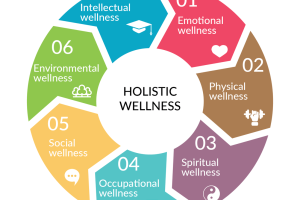The Ultimate Guide to Holistic Health and Well-being

Introduction to Holistic Health and Well-being
What is Holistic Health?
Holistic health is an approach that considers the whole person, emphasizing the interconnectedness of body, mind, and spirit. Unlike conventional healthcare, which often focuses on isolated symptoms, holistic health takes into account emotional, social, and environmental factors. For instance, someone experiencing chronic fatigue might discover that stress and poor nutrition are significant contributors, rather than just a physical ailment. This comprehensive perspective encourages individuals to engage in practices that promote overall well-being. Some foundational elements of holistic health include:
- The Ultimate Guide to Holistic Health and Well-being
- Introduction to Holistic Health and Well-being
- What is Holistic Health?
- Importance of Well-being
- The Mind-Body Connection
- Understanding the Mind-Body Relationship
- Practices for Overall Wellness
- Nutrition for Holistic Health
- Benefits of a Balanced Diet
- Superfoods for Well-being
- Physical Activity and Exercise
- Impact of Exercise on Mental Health
- Holistic Approaches to Fitness
- Stress Management Techniques
- Mindfulness and Meditation
- Relaxation Exercises for Well-being
- Sleep and Holistic Health
- Importance of Quality Sleep
- Tips for Better Sleep Hygiene
- Holistic Approaches to Mental Health
- Alternative Therapies for Mental Well-being
- Building Resilience and Coping Strategies
- Emotional Balance and Self-care
- Practices for Emotional Wellness
- Self-care Routines for Holistic Health
- Relationships and Social Connections
- Impact of Healthy Relationships on Well-being
- Building a Supportive Network
- Environmental Factors and Holistic Health
- Importance of a Healthy Environment
- Practices for Sustainable Living
- Nutrition: Eating a balanced diet rich in whole foods.
- Physical activity: Regular movement that aligns with one’s personal preferences.
- Mental health: Prioritizing strategies for emotional resilience and stress relief.
Importance of Well-being
Well-being is fundamental to leading a fulfilling life. When individuals prioritize their well-being, they often experience enhanced happiness and productivity. Personal anecdotes reveal that those who adopt holistic practices tend to:
- Manage stress more effectively.
- Maintain healthier relationships.
- Enjoy a stronger immune system.
Understanding that well-being encompasses more than just physical health can be transformative for many people. By integrating holistic health principles, one can truly embrace a lifestyle that nurtures every aspect of their being.
The Mind-Body Connection
Understanding the Mind-Body Relationship
The mind-body connection is a fascinating concept that underscores how our mental and emotional states can profoundly affect our physical health. When stress, anxiety, or negative thoughts predominately occupy one’s mind, it can lead to physical symptoms such as tension headaches or digestive issues. For example, a friend of mine found relief from persistent back pain after attending therapy sessions that focused on stress management. Understanding this relationship empowers individuals to take charge of their well-being. In essence, nurturing one’s mind can have a ripple effect on bodily health.
Practices for Overall Wellness
Integrating practices that promote a harmonious relationship between the mind and body is vital. Here are some effective strategies:
- Mindfulness meditation: Helps reduce stress and increases self-awareness.
- Yoga: Combines physical movement with breath control to enhance relaxation.
- Deep breathing exercises: Simple yet powerful techniques to calm the nervous system.
By making these practices a part of daily life, individuals can foster greater overall wellness and elevate their health journey.
Nutrition for Holistic Health
Benefits of a Balanced Diet
When it comes to holistic health, nutrition plays a pivotal role. A balanced diet serves as the foundation for overall well-being, providing the necessary nutrients that fuel both the mind and body. My own experience with adopting a more wholesome diet highlighted the difference it can make; I noticed increased energy levels and improved mood within weeks. Some key benefits of maintaining a balanced diet include:
- Enhanced immune function: A variety of nutrients strengthens the body’s natural defenses.
- Better digestion: Fiber-rich foods support gut health.
- Stable energy levels: A mix of carbohydrates, proteins, and fats sustains energy throughout the day.
Superfoods for Well-being
Incorporating superfoods into your diet can amplify health benefits. These nutrient-dense foods are powerhouses for your body and mind. Some popular superfoods to consider are:
- Blueberries: Loaded with antioxidants, they boost brain health.
- Quinoa: A complete protein that supports muscle repair and energy.
- Chia seeds: High in omega-3 fatty acids, which promote heart health.
By focusing on a balanced diet and including superfoods, individuals can cultivate a fruitful path toward holistic health.
Physical Activity and Exercise
Impact of Exercise on Mental Health
Continuing the journey toward holistic health, physical activity stands out as a vital component that significantly impacts mental health. Regular exercise releases endorphins, often referred to as “feel-good” hormones, which can lead to improved mood and a reduction in feelings of anxiety and depression. Personally, I discovered that my daily morning jog not only boosted my physical fitness but also enhanced my emotional resilience throughout the day. The benefits of exercise for mental health include:
- Stress reduction: Physical activity lowers cortisol levels, alleviating stress.
- Improved sleep: Regular movement can foster deeper, more restorative sleep.
- Increased self-esteem: Achieving fitness goals boosts confidence and mental clarity.
Holistic Approaches to Fitness
Incorporating holistic approaches into fitness can further amplify these benefits. Engaging in activities that nurture both the body and mind is essential. Consider integrating:
- Yoga: It combines physical postures with breathwork and meditation, promoting mental clarity and flexibility.
- Dance: Not only is it fun, but it also enhances mood and social connectivity.
- Nature walks: Spending time outdoors fosters a connection with the environment while providing gentle exercise.
By embracing a holistic approach to fitness, individuals can harmonize their physical and mental health, enriching their overall well-being.
Stress Management Techniques
Mindfulness and Meditation
Transitioning from the importance of physical activity, effective stress management techniques are crucial for maintaining holistic health. One of the most impactful methods is mindfulness and meditation. These practices encourage individuals to focus on the present moment, helping to quiet racing thoughts. I often set aside just ten minutes each morning to meditate, which has transformed my ability to handle the day’s challenges with greater ease. Benefits of mindfulness and meditation include:
- Reduced Anxiety: Both practices help quiet the mind, leading to lower levels of anxiety.
- Enhanced Focus: Regular practice improves concentration and decision-making skills.
- Emotional Balance: These techniques promote a deeper understanding of one’s emotions.
Relaxation Exercises for Well-being
In addition to mindfulness, incorporating relaxation exercises can further enhance well-being. Simple techniques like progressive muscle relaxation or guided imagery can be incredibly effective. Here are a few to try:
- Deep Breathing: Take slow, deep breaths, inhaling through the nose and exhaling through the mouth.
- Gentle Stretching: Engaging in light stretching can release tension in the body and calm the mind.
- Visualization: Picture a serene place, focusing on the details to create a calming mental escape.
By embracing mindfulness and relaxation exercises, individuals can effectively reduce stress and create a more balanced, joyful life.
Sleep and Holistic Health
Importance of Quality Sleep
Continuing the journey toward holistic health, it’s essential to recognize the vital role that quality sleep plays in overall well-being. Sleep is not just a time for rest; it’s when the body repairs itself and the mind processes daily experiences. Personally, I’ve noticed significant improvements in my mood and cognitive function after prioritizing restful sleep. Quality sleep contributes to:
- Enhanced Memory: During sleep, the brain solidifies memories and enhances learning.
- Emotional Regulation: Sufficient rest helps manage mood swings and reduces irritability.
- Physical Recovery: Sleep supports muscle repair and strengthens the immune system.
Tips for Better Sleep Hygiene
To optimize sleep quality, adopting good sleep hygiene practices is crucial. Here are some effective tips:
- Establish a Routine: Go to bed and wake up at the same time every day, even on weekends.
- Create a Sleep-Friendly Environment: Ensure your bedroom is dark, quiet, and cool.
- Limit Screen Time: Avoid electronics at least an hour before bed to prevent blue light disruption.
Incorporating these practices into daily life can lead to more restful nights and invigorating days, ultimately enhancing holistic health.
Holistic Approaches to Mental Health
Alternative Therapies for Mental Well-being
As we delve deeper into mental health, it’s essential to explore holistic approaches that complement traditional therapies. Alternative therapies can offer valuable tools for enhancing mental well-being. For example, I explored art therapy during a particularly stressful period, discovering a creative outlet that allowed me to express feelings I often struggled to articulate. Some alternative therapies to consider include:
- Aromatherapy: Utilizing essential oils to promote relaxation and reduce anxiety.
- Acupuncture: This ancient practice aims to balance energy flow and alleviate stress.
- Music Therapy: Listening to and creating music can profoundly impact mood and emotional expression.
Building Resilience and Coping Strategies
In addition to alternative therapies, building resilience is crucial for navigating life’s challenges. Developing effective coping strategies can help individuals bounce back from setbacks. Here are a few practices to enhance resilience:
- Positive Self-Talk: Replacing negative thoughts with affirmations strengthens mental fortitude.
- Social Support: Maintaining connections with friends and family provides a safety net during tough times.
- Mindfulness and Reflection: Regularly taking time to reflect on experiences encourages growth and understanding.
By integrating these holistic approaches into daily life, individuals can foster mental well-being, equipping themselves with the tools to thrive amidst challenges.
Emotional Balance and Self-care
Practices for Emotional Wellness
As we continue exploring holistic health, achieving emotional balance is crucial. Emotional wellness involves recognizing and managing emotions, leading to healthier relationships with ourselves and others. For instance, during a particularly challenging time in my life, I found that journaling daily helped me process my feelings and gain clarity on my thoughts. Some effective practices for promoting emotional wellness include:
- Gratitude Journaling: Writing down things you are grateful for can foster a positive mindset.
- Setting Boundaries: Learning to say “no” protects your emotional space and allows for self-care.
- Expressive Arts: Engaging in creative outlets, such as painting or dancing, can act as a release for pent-up emotions.
Self-care Routines for Holistic Health
In tandem with emotional wellness practices, establishing a self-care routine is vital for holistic health. A well-rounded self-care regime nurtures the mind, body, and spirit. Here are some self-care activities to consider integrating into your routine:
- Pampering Sessions: Treat yourself to a spa day at home with baths and skincare.
- Nature Walks: Spend time outdoors to connect with nature and recharge your energy.
- Scheduled Downtime: Prioritize alone time to engage in relaxing activities that bring you joy.
By incorporating these practices and routines into daily life, individuals can foster emotional balance, ensuring a holistic approach to well-being.
Relationships and Social Connections
Impact of Healthy Relationships on Well-being
Transitioning to the importance of relationships, it’s vital to recognize how healthy social connections significantly enhance overall well-being. Engaging with supportive friends and family not only helps reduce feelings of loneliness but also contributes to improved mental health. Personally, I’ve found that sharing joys and challenges with close friends deepens connections and brings perspective during tough times. The benefits of fostering healthy relationships include:
- Emotional Support: Sharing experiences provides comfort and reassurance during difficult periods.
- Increased Happiness: Positive interactions and laughter boost mood and foster a sense of belonging.
- Improved Health: A strong social network has been linked to better physical health and longevity.
Building a Supportive Network
To cultivate these enriching relationships, actively building a supportive network is essential. Here are some practical steps to consider:
- Join Groups or Classes: Engage in activities that interest you to meet like-minded individuals.
- Reach Out Regularly: Make an effort to check in with friends or family, whether through phone calls or messages.
- Be Open and Authentic: Share your true self to create meaningful connections built on trust.
By investing in relationships and nurturing social connections, individuals can enhance their emotional health while enjoying a more vibrant, fulfilling life.
Environmental Factors and Holistic Health
Importance of a Healthy Environment
As we explore the intersection of holistic health and the environment, it’s essential to recognize how our surroundings influence overall well-being. A healthy environment fosters physical and mental health by providing clean air, access to nature, and a sense of safety. I remember feeling rejuvenated during a weekend camping trip, where the tranquil natural setting lifted my spirits and helped me disconnect from daily stressors. Key benefits of a healthy environment include:
- Reduced Stress Levels: Nature has a calming effect, which can alleviate anxiety.
- Physical Activity Opportunities: Accessible green spaces encourage exercise and outdoor activities.
- Enhanced Mental Clarity: Clean and organized surroundings promote productivity and peace of mind.
Practices for Sustainable Living
To cultivate a healthier environment, adopting sustainable living practices is crucial. Here are some actionable steps individuals can take:
- Reduce Waste: Embrace a zero-waste lifestyle by recycling and composting.
- Support Local Produce: Purchase food from local farmers to help reduce the carbon footprint.
- Go Green at Home: Incorporate plants into your living space to improve air quality and create a soothing atmosphere.
By acknowledging the importance of environmental factors and implementing sustainable practices, individuals can enhance their holistic health and contribute positively to the world around them.





